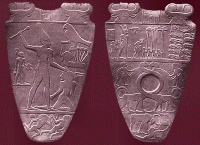COURSE OUTLINE
| Instructor: |
Dr.
Ewa Wasilewska |
| Office
hours: |
By
appointment only; please call the Department of Anthropology (581-6251)
and leave your name, phone number, and class number. Email: Mruczek@AOL.com |
| Time: |
Each
Tuesday at 2:00 p.m. to 5:00 p.m. |
| Location: |
Campus
ST 216 |
| Important
dates: |
September 3, 2008 - last day to drop classes
September 8, 2008 - last day to register, elect CR/NC option or to audit classes
October 24, 2008 - last day to withdraw from term length classes |
| Required
Texts: |
Gay
Robins: The Art of Ancient Egypt. Harvard
University Press: 2000. (GR)
Douglas J. Brewer & Emily Teeter: Egypt and the Egyptians. Cambridge University Press: 2007. (BT)
Nicholas
Grimal:
A History of Ancient Egypt.
Blackwell: 1994. (NG)
Claude
Traunecker: The Gods of Egypt.Cornell
University Press: 2001. (CT)
*
The above books can be purchased at the University of Utah Bookstore.
|
| Optional
Texts: |
Karl-Theodor
Zauzich: Hieroglyphs without Mystery.
University of Texas Press: 1996. (KTZ)
*
The above book can be purchased at the University of Utah Bookstore.
*
Also on the Reserve in the Marriott Library. |
| Subject: |
This
course is an introduction to archaeology, religion, history, art, architecture
and other aspects of Pharaonic Egypt. It covers a period directly
preceding the unification of Egypt (ca. 3200 B.C.) until the Hellenistic
period, beginning with the "liberation" of Egypt by Alexander the Great
in the fourth century B.C. The most important and interesting elements
of the more remote prehistoric past will also be discussed.
Throughout
the semester special focus will be placed on theoretical and methodological
issues involved in interpretation of ancient Egyptian records. Students
will concentrate on such problems as chronology of Egypt, interpretation
of written records and main characteristics of archaeological artifacts,
which facilitate process of proper identification of cultural groups and
interpretation of behavioral patterns.
During
the semester numerous references will be made to other cultures of the
Middle East and outside of this region.
Ppt. presentations and selected films will be used as visual aids. |
| Requirements: |
UNDERGRADUATE
STUDENTS
The
final grade will be based on three exams. Exams will consist of
different sections (including essay questions) especially designed for
the type of material that will be covered during class meetings.
In order to pass these exams it is necessary to attend lectures and to
read the required material. Since the amount of information to which students
will be exposed is enormous, three or four extra review sessions are planned
after the last session before each exam, after the regular class period.
The most important information, names, terms, definitions, etc., can be
found in the notes prepared by the instructor in order to structure the
learning process in the most effective way. At the end of the semester
each student will be required to write a ca. 5 page essay on the topic
that he or she found the most interesting with regard to the influence
of ancient Egyptian civilization on modern cultures.
GRADUATE
STUDENTS
In
addition to the requirements listed above, graduate students are required
to write a research paper of ca. 20 pages (plus bibliography). Each topic
must be discussed with the instructor first and by the end of the semester
each graduate student will be asked to present a brief summary of his or
her research to the class. |
Week
# 1 - August 26, 2008
| Time
and Space: introduction to terminology and geography of the area.
Movies:
Egypt: The Habit of Civilization (LEGACY #4) -- V-Cass CB 311 L43
1991 pt.4
Egypt: Journey to the Global Civilization. CB 311 M48 2003 v. 1
Readings
for WEEK 1:
BT: Chapters 1 & 2: Pp. 1-29.
Readings
for WEEKS # 2 & 3:
NG:
Introduction: Pp. 1-13. Writing. Pp. 31-35.
BT:
Chapter 8: Pp. 127-141.
KTZ:
Whole book. |
........... |
|
Week
# 2 - September 2, 2008
| History
of studies. Decipherment of Egyptian Script and Language. Inscribed material.
Part 1. |
.......... |
|
Week
# 3 - September 9, 2008
| History
of studies. Decipherment of Egyptian Script and Language. Inscribed material.
Part 2.
Movie:
Egypt
Uncovered - Part 4: Deities and Demons. DT61 E336 1998 V.4; 50 min.
Readings
for WEEKS # 4, 5, 6:
BT: Chapter 3: Pp.30-59.
NG:
Chapter 2: Pp.40-48.
CT:
Whole book. |
.......... |
|
Week
# 4 - September 16, 2008
| Chronology.
Religion and Funerary Beliefs. Part 1.
Movie:
Egypt
Uncovered - Part 5: Mummies: Into the Afterlife. DT61 E336 1998 V.5;
50 min. |
.......... |
|
..
Meeting
# 5 - September 23, 2008
| Chronology.
Religion and Funerary Beliefs. Part 2.
REVIEW!!!
|
.......... |
|
..
Week
# 6 - September 30, 2008
| EXAM!
Readings
for WEEKS # 7, 8, 9:
BT: Chapter 4: Pp. 60-78.
NG:
Chapter 1: Pp.17-39. Chapter 3: Pp.49-59.
GR:
Chapter 1: Pp. 12-29. Chapter 2: Pp. 30-39.
|
.......... |
|
Week
# 7 - October 7, 2008
| The
Pre-Dynastic and Early Dynasty Period: Main Events, Art and Architecture.
Part 1
Movie:
Egypt
Uncovered - Part 1: Chaos and Kings. DT61 E336 1998 V.1
Week
# 8 - October 14, 2008
FALL BREAK!
Week
# 9 - October 21, 2008
The
Pre-Dynastic and Early Dynasty Period: Main Events, Art and Architecture.
Part 2.
Readings
for WEEKS # 10, 11, 12:
BT: Chapters 9-12: Pp.142-210.
NG:
Chapter 4: Pp. 63-101. Chapter 5: Pp.102-136.
GR:
Chapter 3: Pp. 40-57. Chapter 4: Pp. 58-79. |
.......... |


|
Week
# 10 - October 28, 2008
| The
Old Kingdom: Historical Outline, Architectural Achievements, Art. Part
1.
Movie:
Egypt
Uncovered - Part 2:The Resurrection Machine. DT61 E336 1998 V.2 |
.......... |
|
Week
# 11 - November 4, 2008
| The
Old Kingdom: Historical Outline, Architectural Achievements, Art. Part
2.
REVIEW!!!
|
.......... |
|
Week
# 12 - November 11, 2008
EXAM!
Readings
for WEEKS # 13 & 14:
NG:
Chapter 6: Pp.137-154. Chapter 7: Pp.155-181.
GR:
Chapter 5: Pp. 80-89. Chapter 6: Pp. 90-109. Chapter 7: Pp. 110-121.
|
.......... |
|
Week
#
13 - November 18, 2008
| The
First Intermediate Period. The Middle Kingdom: Historical Outline. |
.......... |
|
Week
# 14 - November 25, 2008
| The
Middle Kingdom: Its Artistic and Other Contributions to the Dynastic Egypt.
Readings
for WEEK #15:
NG:
Chapter 8: Pp. 182-195. Part III: Pp. 197-292. |
.......... |
|
Week
# 15 - December 2, 2008
| The
Second Intermediate Period. The New Kingdom: Historical Outline.
Movie:
Egypt
Uncovered - Part 3: Age of Gold. DT61 E336 1998 V.3
Readings
for WEEK #16:
BT: Chapter 7: Pp. 110-126.
NG:
Part III: Pp. 197-292.
GR:
Chapter 8: Pp. 122-147. Chapter 9: Pp. 149-165. Chapter 10: Pp. 166-193.
|
.......... |
|
Week
# 16 - December 9, 2008
| The
New Kingdom: The Art and Architecture of the Empire.
REVIEW!!!
In
order to study the Late Period please proceed with the following readings:
NG:
Part IV: Pp. 309-388.
GR:
Last chapters.
The
last day to turn in essays (undergraduate and graduate students) and research
papers (graduate students). |
.......... |
|
Week
# 17 - December 16, 2008
FINAL EXAM!
 IMPORTANT!!! IMPORTANT!!!
ACADEMIC MISCONDUCT
Please familiarize yourself with the University of Utah CODE OF STUDENT RIGHTS AND RESPONSIBILITIES (“STUDENT CODE”) at www.admin.utah.edu/ppmanual//8/8-10.html
The following is an excerpt from this CODE explaining specific actions, which won’t be tolerated in this class.
“2. “Academic misconduct” includes, but is not limited to, cheating, misrepresenting one's work, inappropriately collaborating, plagiarism, and fabrication or falsification of information, as defined further below. It also includes facilitating academic misconduct by intentionally helping or attempting to help another to commit an act of academic misconduct.
a. “Cheating” involves the unauthorized possession or use of information, materials, notes, study aids, or other devices in any academic exercise, or the unauthorized communication with another person during such an exercise. Common examples of cheating include, but are not limited to, copying from another student's examination, submitting work for an in-class exam that has been prepared in advance, violating rules governing the administration of exams, having another person take an exam, altering one's work after the work has been returned and before resubmitting it, or violating any rules relating to academic conduct of a course or program.
b. Misrepresenting one's work includes, but is not limited to, representing material prepared by another as one's own work, or submitting the same work in more than one course without prior permission of both faculty members.
c. “Plagiarism” means the intentional unacknowledged use or incorporation of any other person's work in, or as a basis for, one's own work offered for academic consideration or credit or for public presentation. Plagiarism includes, but is not limited to, representing as one's own, without attribution, any other individual’s words, phrasing, ideas, sequence of ideas, information or any other mode or content of expression.
d. “Fabrication” or “falsification” includes reporting experiments or measurements or statistical analyses never performed; manipulating or altering data or other manifestations of research to achieve a desired result; falsifying or misrepresenting background information, credentials or other academically relevant information; or selective reporting, including the deliberate suppression of conflicting or unwanted data. It does not include honest error or honest differences in interpretations or judgments of data and/or results.”
The following sanctions will be imposed in this class for a student engaging in academic misconduct:
1. A failing grade for the specific assignment, paper, exam, etc., without possibility to re-write it, re-take it, etc. This academic misconduct will be reported to the Chairman of the Department of Anthropology.
2. The second offense will be sanctioned with a failing grade for the whole course. In such a case, the following rule of the University of Utah CODE OF STUDENT RIGHTS AND RESPONSIBILITIES is applicable and will be followed: “If the faculty member imposes the sanction of a failing grade for the course, the faculty member shall, within ten (10) business days of imposing the sanction, notify in writing, the chair of the student’s home department and the senior vice president for academic affairs or senior vice president for health sciences, as appropriate, of the academic misconduct and the circumstances which the faculty member believes support the imposition of a failing grade.”
3. For more information concerning sanctions for academic misconduct (additional sanctions might be imposed) and your rights and procedures to appeal these sanctions please refer to the aforementioned CODE.
If you need more information and/or explanations please don’t hesitate to contact the instructor.
Ewa
Wasilewska's Home Page |



